BASED DELEUZE
On Lil B, the meaning of the term "based", and its relation to the contemporary social field
If there is any good reason to assemble “Maoist death squads” in America, it is to hold guns to the heads of those who debate the meaning of the term based & ask them to name a single song by Lil B the Based God. On this subject we must insist: No investigation, no right to speak!
The word “based” is now widely used by various functionaries of the Republican Party who seem not entirely sure of its meaning or when it is appropriate to say it. "It's something they say online, it means you know, you're cool, you get it, you're one of us".
The tragedy is that the only person to theorize "based" thus far is Justin Murphy in his short book Based Deleuze, which I do not recommend. Murphy's understanding of the philosophy of Gilles Deleuze seems poor, & his understanding of Lil B the Based God (the greatest conceptual artist of the 21st century thus far) is nonexistent. This is unfortunate, because there is a wealth of connections that can be drawn between these two important figures, and by holding these figures in dialogue we can explore a great deal of what is going on with respect to shifts of consciousness on the internet, in mass culture, & in contemporary politics.
Often today, “based” is used in juxtaposition with “woke”, & these two ill-defined terms make up two poles of a cultural-ideological spectrum. The “based” vs. the “woke”. At worst, this dichotomy leads to rightist political types saying phrases like “oh, he's more based than I am”, where “based” in this context means one's distance from wokeness, or often simply being more willing to endorse racism.
This rightist ideological meaning of based is quite far from the original expression of Lil B, a dadaist-absurdist internet rapper whose politics are of a loosely idealistic left-libertarian bent. To Republicans, Lil B would probably be considered woke, as Lil B has always for example been vocally supportive of trans & gender non-conforming people. “Stop the killing, & stop the hatred, people should be able to walk around the fucking streets naked”, he says at one point in his song I Can't Breath, a characteristic sentiment.
The right-wing connotations of based, despite its pervasiveness in online political discourse, are not present in how the term continues to be used in SoundCloud rap & related discourses. For example, we can observe xaviersobased, probably the most forward-thinking rapper in NYC right now, choosing to used “based” in his name out of tribute to the Based God while making his political affiliations clear, saying “I can't fuck with niggas if they right wing” in his song patchmade. I also would like to give a personal shout out to “Based Retard Gang”, another group making futuristic SoundCloud music right now under the banner of based.
So what does based actually mean, in its original formulation? According to Lil B: “Based means being yourself. Not being scared of what people think about you. Not being afraid to do what you want to do. Being positive.”
But does this actually contradict the new, politicized definition of the term? After all, if we take for example some white racist, who yells for whomever might hear: “I am a white racist, I reject the right of other races to pursue their own liberty if it gets in the way of securing an existence for my children,” — is he not being true to his own subjectivity, & affirming himself & his own will in a positivist manner in doing so? And is the center-right Republican — highly sympathetic to these views but unwilling to speak them because he is censored by some imaginary Other — not right to classify the racist as more based than he?
The intention of Murphy’s book Based Deleuze was to convince the online right or Dissident Right that there might be some right-ish ideas in Deleuze which would make him worth their while to read. Murphy’s book makes some weak arguments attempting to connect Deleuze to right-wing ideas which are not only flimsy, but could even be considered slanderous, such as the ludicrous implication that Deleuze might have intended his writings to promote race-realism. One can only imagine what Deleuze would think if he were alive to read Murphy’s book. Deleuze once said that the primary task of philosophy is to make stupid people feel ashamed of themselves1. It seems as if, at least in this case, philosophy has failed.
Are there overlaps between Deleuze’s ideas & those of the Dissident Right? Yes. Based Deleuze's appeal to the Right could have consisted of one sentence: Deleuze is a Nietzschean, & in fact the 20th century's foremost Nietzschean other than perhaps Heidegger. If we take Bronze Age Pervert as the exemplary figure & leader of the Dissident Right, then we could characterize Deleuzean metaphysics & the Dissident Right as two diverging strands of post-war Nietzschean thought.
The concept of the “nomadic war machine” in A Thousand Plateaus has a great deal in common with Bronze Age Pervert's call for gangs of young men to leave modern decadent society & form piratical war bands; the main difference being that in Deleuze's vision the war-machine is third-worldist & in BAP’s it is white supremacist. And the idea that A Thousand Plateaus could be used to inspire militant white supremacist war bands has proven to be true in practice, ever since it has been revealed that the Israel Defense Force taught its theories to its soldiers for the development of shock-and-awe tactics while occupying Palestine.
As for Lil B — Based means being yourself, entirely true to yourself, & not another. Insofar as one becomes oneself, one is able to carry out the second movement of based, which is to become positive, or to affirm one's experience & life. Given that the stakes of based are to escape nihilism & affirm existence through developing a singularity of the will, we can consider Lil B's aphoristic philosophy to be roughly coextensive with the Nietzschean ethical project.
Ultimately what is at stake for Nietzsche, & by consesquences Deleuze, is a philosophical struggle that is of immense importance for contemporary politics: that between relativism & perspectivalism. The difference between these two ethics may seem subtle & overly theoretical, but it carries a profound weight.
To illustrate relativism, we can pick a common example of a relativist statement: “All cultures are equal”. This statement, commonly expressed, is wholly stupid. All cultures are equal, by what metric, & according to whom? The speaker typically fails to establish this ground & thus is simply indicating his refusal to judge cultures according to any metric at all, & as such has in fact said nothing. He is trying to take on a non-perspective, a perspective from absolutely nowhere.
Perspectivalism, on the other hand, is the assertion that any system or ethic must indicate a perspective which provides its context & through which its ethical claims are able to be understood. The perspectivalist says: I have my perspective, I affirm my own truth from within this perspective. However, you may have your own perspective, & even if you affirm a truth radically at odds with mine, I can still admire your capacity to affirm as noble.
To illustrate perspectivalism, I can relay an anecdote of a time I was eating dinner with a supporter of Bronze Age Pervert & active contributor to the Dissident Right. He was talking at length about how the European conquest of Africa was a positive thing, given that Africans are unable to properly govern themselves. I mentioned offhand something a friend of mine had said on the subject, who I told him was a black Jamaican Nationalist. When this BAP supporter heard about my friend being a Jamaican Nationalist, he said approvingly: “Based.”
This is a perspectivalist position, presumably derived from Nietzsche through BAP. The perspectivalist (in this case the BAPist) is able to affirm even a perspective diametrically opposite to his own as long as it is possible to be affirmed through its own self-constructed logic, though the BAPist still does not adopt it as his own perspective. Even if these two perspectives - that of the colonizer & that of the resisting colonized subject - are at odds, even if they are so at odds that they will meet one day in life-or-death struggle on the battlefield, the perspectivalist still gives praise to God for giving him a worthy enemy to slaughter.
What the perspectivalist scorns & spits at are perspectives which are truly sick, such as the non-perspective of the relativist, who is unable to affirm anything at all. The worst possible perspective would be that of the “cucked” woke person, who says something like “I may have my own opinion on this subject, but I am a white man & I think we white men have said far too much; I wish we had a black woman in the room so she could speak in stead of me”. This stance is even worse than that of the relativist, as it actually assigns a negative quality to the speaker's own will, & the only logical activity for someone who speaks like this would be suicide.
It is often said in various dissenting circles that the ideological conflict of the 21st century will not be the capitalism vs. communism of the Cold War, but globalism vs. multi-internationalism. Will a single culture & ideology & system of governance be forced on all nations of the world, as in globalism, or will individual nations be allowed to determine their own systems of life while mutually coexisting, affirming their own ways of life yet also affirming one another? This is of course the same question as relativism vs. perspectivalism, but in the domain of international affairs.
By making the relativism vs. perspectivalism distinction, we can air out some muddled philosophical discourse around whether or not the new right or Dissident Right is “postmodernist” (& if they are, whether or not they are hypocritical in being so). Someone like Jordan Peterson will for example rage at “postmodern neo-Marxists” like Deleuze for eroding the foundation of truth & making it impossible to definitively affirm anything. But the irony, for people who believe that there is a singular postmodernist epistemology, is that Peterson himself seems to be a postmodern relativist insofar as he often defends the idea that pagan myths & fairly tales are just as “true” in some psychological sense as modern science.
The truth is that the “postmodern neo-Marxists” — if by that we mean the original fathers of post-structuralist thought i.e. Foucault, Derrida, Deleuze — are all perspectivalists, not relativists. Relativism is a timid liberal position, not a “neo-Marxist” one. Relativism is imposed by liberalism, as it is the suspension of judgment upon the lifestyle of one’s fellow citizens which is considered necessary for coexistence under a liberal democracy.
Thus, for the Dissident Right to reject liberal relativism & embrace perspectivalism is not incoherent, & follows Deleuze, who made a major point to differentiate his own affirmative philosophy from “the philosophy of the beautiful soul”2. The “beautiful soul”, Deleuze's philosophical enemy, carries the logic of affirmation so far that it leads him to look at a suffering homeless person & declare it to have a poetic quality. To the beautiful soul, the tragedy of the homeless man's suffering is all part of the infinite play of light & shadow in God's creation. This apathetic, fatalist perspective must be rejected. Rather, according to Deleuze, he who is truly able to affirm affirms not merely nature but also his own point of view & own ethics, & can from there point to his own enemies & positive tasks, such as affirming the eradication of homelessness (if that is what he wills).
For someone who is, say, a more conventional left-leaning or “neo-Marxist” reader of Deleuze, does the contemporary terrain present problems? The issue is: perspectivalism is the correct way to think. It is not just the only way we can independently develop our own ideas & thus secure freedom for ourselves, but also the only way we can coexist amongst other perspectives without a bureaucratic State needed to provide some castrating relativistic framework to mediate between us. So why is it that perspectivalism is widely becoming the domain of the right, & even of its most racist & fascistic elements? Will there ever be a left-wing or humanistic perspectivalism again?
We can answer this by answer a similar question: which meaning of based will ultimately prevail, that of Lil B (based meaning being positive while true to yourself) or the one used as a right-wing dog-whistle (based as bigoted, as opposed to "woke"?
People who have no clue what they are talking about repeatedly proclaim the death of based. “Stop saying it, the normies got to it, it’s becoming cringe”, they say. This is a foolish prediction. Based will ascend to the point where it will be a permanent fixture of the English language, like “cool”. And it will still be based to say it — based exists beyond some petty logic of hipsterdom, as it is the embrace of existence itself.
Murphy got one thing catastrophically wrong in his attempt to theorize based. He defined based as indicating rootedness: based as in “grounded”, as in: two feet on the ground in some physical location. From there, he derived its relevance to the nationalist & racist right, via their focus on having specific roots in a specific place & genetic line3.
Nothing could be further from based in its original conceptualization by Lil B than Murphy's idea of rootedness. The origin of based came from Lil B (a very eccentric person who seems to have some kind of neurodivergent condition) getting teased in high school. His peers called him “based”, which derived from “freebased”, as in cocaine — essentially they were saying that he seemed high on crack. In fact, Lil B was just being himself, so he inverted the pejorative into his original definition of the word.
Starting from this point, based generally connotes not that which is grounded, but that which is radically untethered, unconditioned, abstracted, & deterritorialized. Lil B has released a truly staggering amount of music, perhaps over five thousand songs by some counts, most of which are freestyled & have an unhinged quality. Something like a quarter of his songs are given the appellative “BASED FREESTYLE”, which indicates only an increased element of nonsensicality, disregard for technical skill, & free-association. I'm Orange Juice (BASED FREESTYLE), in which he raps non-rhymingly from the perspective of the aforementioned drink, is one such illustrative example.
The reason I say that Lil B is the greatest conceptual artist of the 21st century is because he is one of only a tiny number of artists who actually uses the internet itself as an art medium, rather than making art in some existing medium & distributing it via the Net. Lil B is the formative internet rapper, & every internet rapper who followed him, whether the early-2010s underground generation of Metro Zu, Odd Future, Spaceghostpurrp, or the newer, more well-known SoundCloud generation of Lil Uzi Vert, Playboi Carti, & Bladee is deeply indebted to him. Certainly, SoundCloud rap would not exist anything like how it is, were it not for Lil B.
(For whatever reason, Lil B has chosen not to cash in on his fame & influence, refusing to sign to a record label, sell merch, even put ads on his YouTube account — at one point he put an album on iTunes for sale, but then leaked the link to a Mediafire download on Twitter, saying he if any of his fans can't afford the $10, they can have it for free. This total disregard for personal wealth lends him a remarkable quality of some kind of modern Christ, Buddha, or Socrates.)
Internet rap begins with Soulja Boy in 2007, who, as a sixteen year old, managed to turn his self-produced song Crank That into a global #1 hit by uploading it to LimeWire mislabeled as other popular songs for unaware listeners to download. This hacker-like injection of a new sound into global consciousness has had the quality of a radical rupture in pop art, & seems to have fascinated Lil B, who has repeatedly identified Soulja Boy as his favorite rapper & his greatest inspiration.
What is interesting about Soulja Boy (at the risk of offending any Soulja Boy fans in the audience), is how stupid & low-quality his music is, almost transcendentally so, while also being churned out in such large numbers. Soulja Boy’s music, despite reaching the mainstream, almost has the quality of outsider art, as its creator often seems to be lacking some essential self-awareness that connects him to the human race. Lil B, then, is something like the Frank Zappa to Soulja Boy's The Shaggs — something about the failure of Soulja Boy’s art is more interesting to him than hip-hop which is conventionally “good”.
For a beautiful period which unfortunately seems to have closed, maybe from 2013 to 2020, hip-hop seemed to undergo a glorious progression through degeneration, similar to modernist painting in the early decades of the 20th century. Each new revolutionizing artist, e.g. Future, Young Thug, Playboi Carti, was originally greeted as either an insult or a joke — “this cannot possibly be considered music”, until only a year or two later the new deterritorialized & abstracted sound would find itself widely embraced as canonical, similar to the innovations of a Van Gogh or Matisse.
Lil B seems to have decided early on in his career (around 2009) to surf this edge as hard as he could & make as much “so bad it's good” music as he could possibly fit in a day. There are only a small handful of Lil B songs (eg Age of Information, I Am the Hood) which serve as the equivalent to Picasso's representative work as a teenager: reminders that the artist is entirely capable of crafting by the book & in a wholly technically impressive manner, he simply finds it uninteresting to do so. In most of Lil B's music, technical microphone skill is abandoned along with the aim of making sense.
Lil B’s oeuvre has the surreal quality where the more one delves into his catalog, the more impossible it become to discern any coherent intention of the artist. For example, those who come to Lil B through knowing him as a rapper who is philosophical in a loose, new-age sense will find "conscious rap" songs to support their preconception, such as No Black Person is Ugly or I Love You. Songs like this make up maybe a quarter or so of Lil B's catalog. But the vast bulk of Lil B’s work is quite the opposite — tracks like Kill Every Snitch or Violate That Bitch in which he takes a perspective which is violent, vicious, even nihilistic. Lil B takes absolutely no shame in putting directly contradictory messages in his music, such as Ban the Weapons as opposed to Shoot a Gun, which take opposite stances on the question of Second Amendment rights.
Lil B, a random high school dropout from Berkeley, California, spread his music across the internet through Soulja-Boy-esque tactics such as registering over a hundred MySpace pages in his name, getting by the limitation that each MySpace page would only let you upload five songs each. What is revolutionary on a deeper level, however, is the degree to which Lil B worked memetics into his music & overall branding. Lil B got the internet before almost anyone did. His so-bad-it's-good & is-this-a-fucking-joke? art tapped into the fact that on the internet, people would generally rather mock something than enjoy it, & hate travels farther than love.
This was a period of time in which Millennials would speak of enjoying certain music “ironically” (a completely meaningless & stupid phrase), which is what some thought they were doing with Lil B. Lil B turned their ironic enjoyment into ironic worship, by convincing his fans to speak of the “Based God” as an actual god. “Thank You Based God” was the litany he placed in their supple mouths. (On /pol/, this morphed into “Thank You Based Trump”, “Thank You Based Farage”, etc., which is where the right-wing definition originated). The notion of whether it is possible to worship “ironically” is of course debatable. I have a friend who, upon joining Alcoholics Anonymous did not want to follow the programs doctrine of accepting a monotheistic god as a higher power ruling over him, & so he said all of the AA-imposed prayers instead to “The Based God”. He is now eight years sober.
Thus, Lil B has taken on a practice of radical unrooting. He has abstracted himself through the networks, he has taken on all identities, he has made thousands of songs, he has abandoned sense & created a cult to deify him. He has ascended into some spiritual form, lurking amongst the wires.
Yet his greatest artwork is still perhaps his most basic: the word based itself. Based, as it is used, is an affirmation which does not rest on rationality, consistency or sense. To affirm something by declaring it true or good or beautiful or just is to introduce something more conceptual & dissociated from one's at-hand than to simply affirm it as based.
If I see a man taking a shit in the street as I am walking with my friends, I may point at him & say: based. What does this mean? I affirm it, perhaps I know what it's like to need to urgently shit, & I admire the audacity to do it spontaneously as one wills. Kant's maxim that one should only will what might become a law does not enter my mind, nor matters of public policy. What do my friends say? If they respond: “yes, based”, then it is so. If not, perhaps I re-think.
Nietzsche struggled all his life to become a person who could only say “Yea”. He sought to, upon seeing the sick & wretched, not feel the need to rage against them & negate their existence, but merely turn his gaze4. Deleuze wrote about how “good vs. evil” is a slave morality, or simply a morality: we define morality as that which contains a term such as “evil” which is that which the speaker resents, negates, & condemns. While “good vs. bad” is a master morality, or an ethics, as it indicates what is good or bad for me & my friends from my perspective. Deleuze contrasts morality with ethics by saying that ethics is not about condemnation but a matter of health, like how we can speak of good & bad foods.
(This is somewhat lost in translation from the French, in which a different word for “good” is used between Deleuze’s morality & his ethics, but English apparently lacks this distinction).
Is “based” vs. “cringe” not the tenuous, trivial master ethics of our age? Based indicates a unity of the will, pure affirmation, whereas cringe is nothing but the faltering of the will, its doubling back on itself, the will to turn away. But even to articulate this now is somewhat cringe, as “cringe” itself has become cringe... people kind of stopped saying cringe... it as if we (internet retards) are spiraling into the direction of only an eternal Yea...
The brutal repetition of based as the bedrock for Lil B’s artistic system is reminiscent of a similar term from Deleuze. Deleuze's oeuvre has a quality akin to Lil B’s of being vast & fractally nonsensical. There is a reason why Deleuze is the one philosopher for whom there exists no widely internalized summary for people who haven't read him (Descartes said “I think therefore I am”, Hegel had the thesis-antithesis-synthesis, etc.). Deleuze believed that generally speaking, people are intellectually lazy & need to be forced into thinking; he did not want to make things too easy for his readers. Instead of a summary of his views, Deleuze is associated in the collective consciousness with the bafflement one experiences when trying to penetrate his work: “What the fuck is a body without organs? Explain it to me, or I'll fucking kill you!”
The body-without-organs, as the transcendental term in Deleuze's system (equated with Spinoza's God), is the basis or baseline upon which all activity rests & returns back to. Despite being the ground of all becoming, it is not still, but restless, rumbling, volatile. Deleuze describes it as consisting of “crowned anarchies”.
One of the greatest initial mysteries for those trying to enter into Lil B's world is the structure of his autotheology, or precisely the distinction between “Lil B” & “The Based God”. Lil B will brag about being the Based God, but also thank the Based God, speak about knowing the Based God, being friends with the Based God, having met the Based God. At one point he announces: “I met Lil B & Based God at the same time”. Is the Based God Lil B himself, or is it some deity he prays to? In a lecture Lil B answered this question by saying: “I am not the Based God, because the Based God is bigger than me”.
Keeping in mind the difficulty of extracting consistency or sense from Lil B’s oeuvre, it seems as if the Based God represents Lil B’s conception of his own higher self. Only it is one reached not through discipline or concentration, as in the religious ideal, but through moments of Dionysian anarchy & excess. Only through ascending to these towering heights of chaos & senselessness in his “BASED FREESTYLE”, is he able to achieve the degree of beatitude through which he makes his more coherent, “conscious” songs he is celebrated for such as Motivation or Walk the World, typically attributed to not the Based God but Lil B.
Here we reach one of the paradoxes of based. If I am based, I am being myself, I am being only as I am. But as I become more based, I in fact develop myself into something new, I become other than I was. “Being yourself”, in the sense described by Lil B, does not mean discovering a pre-existing essence of one's being & remaining identical to it. Rather, it means seizing upon moments in which one is able to collapse one's usual multiplicity of conflicting wills into a singular affirmation of one's being, & using this diverging point as the grounding, or basis, for the construction of a personal ethic.
This is akin to the role nonsense plays in Deleuze’s Logic of Sense. In this book, Deleuze raises the question of where sense comes from, as in the ability to make sense of any given statement. Sense is the context through which a statement can be understood, but to communicate this context, one must make a number of statements contextualizing it, each requiring their own sense. Thus there is an infinite hierarchy of sense, which presents a paradox. Deleuze concludes that sense can only ever be grounded in nonsense.
If this is the case, then how does language arise? To answer this, Deleuze invokes a concept of the Event. Language only arises through Events — moments of pure becoming — in which a speaker traverses the whole hierarchy of sense in a single moment & thus establishes sense from nonsense. Deleuze describes these moments as like inflection points in a mathematical curve, from which the rest of the curve can be described. From this theory of language, Deleuze describes a theory of how an individual subjectivity forms, along with “the discovery of one's proper name”, i.e. the differentiation of one's individual self out of the undifferentiated body-without-organs.
Lil B in his music not only describes an unstable identity-relationship with the Based God, but with a wide variety of other figures. One of the most pervasive themes of Lil B's music is how he “looks like” or “thinks he is” or simply “is” all manner of celebrities. “Hoes on my dick cus I look like Marilyn Manson, I look like Bill Gates mixed with Obama”, “Niggas getting mad cus I dress like Jesus Christ”, “I look like Deepak Chopra, my book is kind of better” — the variations never end. Lil B’s relationship with the celebrity at hand never takes a form inspired by sense. For instance, in the chorus of Bill Bellamy, Lil B says “I got nine felonies, I got ten felonies, bitch I'm Bill Bellamy”, despite the fact that Bill Bellamy (a stand-up comedian & Shaquille O’Neal’s cousin) has no felonies.
In Anti-Oedipus, Deleuze & Guattari describe a process through which a “schizophrenic” subject enters a racial delirium in which he takes on all the names in history, reconstituting himself only through channeling all the movements of history through his being, including identifying with each race of man. “(I feel that) I am becoming God, I am becoming woman, I was Joan of Arc and I am Heliogabalus and the Great Mongol, I am a Chinaman, a redskin, a Templar, I was my father and I was my son.”5 Lil B does something similar when he makes statements like “Bitches on my dick cus I'm white like Asher Roth”, despite being black.
Deleuze & Guattari describe the most intense part of this process as when the subject is forced to identify himself with “a race inferior for all of eternity”. They cite as an example of this the schizophrenic poet Artaud's statement: “I am a beast, a Negro”. For Lil B, who is an actual Negro, this process plays out differently, & involves a different wretched figure.
From the beginning of Lil B's career, he would tease listeners by adopting the affects of a homosexual, rapping about wearing a “tiny shirt, & tiny jeans”, boasting “I’m that pretty bitch”, eventually culminating in releasing the album Im Gay (Im Happy) (which is probably his most cohesive project & which I would recommend as an entry point into his discography). In 2023, this does not seem particularly shocking, but in 2010 in hip-hop to say this was to associate oneself with the most shameful thing one could be. It is only through Lil B & a tiny handful of other artists normalizing non-heterosexuality & gender non-normativity in hip-hop that things have changed. (Again, however, given the infinite contradictions of Lil B’s music, this attitude exists alongside songs where he raps about wanting to kill faggots.)
This illustrates one of the fundamental tasks of perspectivalism. If I am a perspectivalist, how am I able to reach out of my own perspective to grasp something larger than what I am able to immediately understand? The relativist attempts to craft a singular perspective that straddles & subsumes all perspectives he encounters, which is not what I intend to do. Rather, I must take on every perspective in turn, in succession, one after another. The perspective I end up with is not that of the State which encompasses & enfolds all, but that of the wise man, who has seen through all eyes, & yet exists beyond their gaze.
The final theme worth remarking on in Lil B’s music is one he incessantly stresses: the number of bitches on his dick. Five, ten, twenty, the number only grows. Occasionally this number is oddly precise: thirty-four, fifty-six, at other times impossibly vast — a thousand, a million, a trillion bitches on Lil B’s dick. This is despite the fact that Lil B eschews all tropes of hip-hop excess in his videos - there are no twerking women, no racks of money, no cars, just him, almost always alone, lip syncing to his song. Details on who these women are & what Lil B does with them are nonexistent.
One begins to suspect that we are not meant to imagine that Lil B actually has ten or twenty girlfriends or whatever the number may be, any more than we are meant to imagine that he actually looks like Ellen Degeneres. Rather, this is another element of his peculiar self-invented metaphysical system. There is some element going on in Lil B which involves a total collapse & immersion in some all-consuming divine erotic feminine. One is reminded of the cosmic rays of Schreber, a schizophrenic evaluated by Freud whose experience provides part of the foundation of Deleuze & Guattari's “schizoanalytic” theories. Schreber believed God was sending him cosmic rays carrying a “voluptuous” quality, or that of erotic pleasure, which stimulated all the surfaces of his body, & would have the ultimate quality of transforming Schreber into a woman if God would have his way with him.
Lil B is positively obsessed with the word “bitch”, releasing mixtapes called “#1 Bitch” & “Ultimate Bitch”, both referring to himself. Lil B in his music calls himself a “bitch” in a manner to how other rappers call themselves a gangster or a thug, & does it so smoothly one even forgets how this is usually a term of shame. At one point, Lil B announced the formation of a gang, the Bitch Mob, whose members would be identified by pink bandanas, though it seems that this gang never formally inaugurated any members other than himself.
Here we have reached the final paradox of based. Based begins as "being yourself", but ends as "becoming everything" — including even that which is remote, disgraceful & obscene.
Can affirmationism & racial identitarian separatism exist simultaneously? The Dissident Right wants to think of themselves as Dionysian & affirmationist, not like the Puritanical dweebs of previous right-wing movements. “Evola listened to jazz”, they will remind each other. But then — you have accepted you will listen to jazz, do you go to the jazz bar? When are you at the jazz bar, do you dance? Do you drink, & when you are drunk, do you let the music carry you away? You are dancing to an interpretation of Coltrane with a Tanzanian woman - if she invites you home, do you make love to her? What, precisely, is the based thing to do? Can this be determined outside of the moment of judgment, the drunken moment of excess in which you are forced to truly determine which action involves consistency with the only ethic we have decided matters: being oneself?
To my knowledge, Lil B has never weighed in on what he thinks of the Dissident Right using his term, despite the fact that he regularly retweets instances of conservatives using the word “based” (this is probably automated). This is not because he likes the right — he has voiced angry opinions regarding them, at one point getting banned for 30 days for "hate speech" from Facebook due to a rant about Republicans. But unlike, for example, Matt Furie, the creator of Pepe the Frog, who has gone on a pathetic campaign of grandstanding & lawfare to try to prevent the right from using his character, Lil B's attitude towards the appropriation of his work seems to be total acceptance.
After all, based is something transcendent that traverses a journey across all points on the globe, including what is most wretched & despised. The increasing adoption of based by the ideological right can only lead to one thing: adoption of based by the ideological left. This would necessarily follow a general trend where the right is more linguistically inventive than the left, coming up with memetic chunks which the left then appropriates. The left has begun to call the right “cucks” & “soyboys”. Following the logic of this process, will the right soon be forced to deal with a based left, an affirmationist left, a left that has abandoned liberal relativism for a master morality of pure will? We shall see.
Based works because the logic of the internet makes perspectivalism inevitable. So many perspectives proliferate that it cannot be possible to integrate them all into a single point of view, as in the pretense of the liberal state. Yet, the global spread of information across of the internet also ensures that to break from collective consciousness entirely is impossible. Therefore, the internet, by its nature, prevents both global homogenization & subsumption of all perspectives into one identity (“globohomo”), as well as rejection of cosmopolitan consciousness & the move to total separatism (“exit”). The future is a secret third thing.
In Deleuze & Guattari's works, they hint at the emergence of something that is both universally encompassing yet maximally diverse: a One-All. They speak of a “full body without organs” at the end of history, which may or may not be the same thing as this. Yet they give no concrete indication of how this will emerge within & out of capitalism.
But look: is based perhaps the greatest neo-Deleuzean linguistic virus yet devised? Is it inevitable that this term would spread as far as the networks could carry it, this term which indicates both God, or the transcendent ground of being, yet also the supreme moment of each individual’s differentiation & achievement of his unique point of view? Is based not destined to be most deterritorialized, overcoded term, as it simply allows each individual to affirm what he already wills? Is Lil B's greatest work already a fait accompli?
And as for the Dissident Right, is it not something entirely unthinkable beyond Twitter, entirely impossible without Twitter, the Twitter ideology par excellence? Twitter, a combative medium, has a certain relationship to the Other which is less like a love song & more like a hip-hop diss. The Twitter user needs to pinpoint an enemy to grow his following, & upon finding the enemy, he wants to do two things: 1. Embarass him 2. Say fewer words than him.
This leads to the pseudo-Nietzscheanism of the Chad-yes meme. In its typical invocation, Soyjak spills out a whole blather of impotent words, to which Chad simply responds “Yes”, his laconic unflappibility indicating that he has the mandate of heaven. Is this the “Yea” of Nietzsche? Perhaps not, because what exactly is Chad actually affirming? Soyjak is the one who is articulating something positive, as he is willing to fill up several sentences with words to make his case against Chad. If Chad is saying “Yes”, it is only in reference to his will to go against Soyjak, the stand-in for the liberal. Chad is constructing nothing of his own, & is in fact afraid to, lest he speak too much, reveal the lack in his being, & lose the mandate of heaven. So which speaker is actually the one affirming anything? This is the based of the reactionary: it is only the will to lash out against.
If the internet continues to develop platforms which feel like Twitter, the Dissident Right might continue to ascend, as Twitter is a fundamentally reactionary platform (that is: reactive, & antisocial). But if the future of the internet looks more like TikTok, then the reactionaries are in trouble.
On TikTok, where one dances rather than argues, the fundamental relationship to the Other is not antipathy & one-upsmanship, but the desire to imitate — a sort of love. Nietzsche said he would believe only in a God who knows how to dance6. On TikTok, there is no downvote or left-swipe; within the logic of the platform, it is impossible to negate. One does not react, one only creates, but one may only articulate onself through becoming like others.
The logic of TikTok pushed to its limit involves all sort of mad & promiscuous becomings criss-crossing the globe, dancers of all races & sexes inspiring bursts of affects in others. The TikTok user who participates in each dance fad — dancing alone, like Lil B affirms the perspective of each race in turn: k-pop, hip hop, reggaeton, bhangra, pop-punk, whatever — at least to the degree that TikTok one day may become a fully integrated global system.
Why is it that capitalism, at the time of writing, affirms transsexuality so eagerly, but Dolezal-style transraciality is scorned? Is it because of what Nick Land wrote in Kant, Capital, & the Prohibition of Incest: capitalism must prevent the deterritorialized flow of commodities in trade from inspiring a deterritorialized comingling of cultures, lest global connectivity bring about an undifferentiated brotherhood of man, & from there, socialism in the essential sense? What took the form of the prohibition against miscegenation in Kant's time now applies only on a non-biological level, with prohibitions against cultural appropriation enforced nearly as ruthlessly (ok, maybe not) as the prohibitions on race-mixing several decades ago.
If this question, so disrespectful to the historical realities of race & culture, is too radical for our current context, it is not so for Lil B. When, for example, internet commentators (for whatever illogical reason) decided en masse that his song No Black Person Is Ugly was racist for praising the beauty of black people while not saying anything about other races, Lil B responding by adding as a comment to his video: “we are all black, I love you”.
Lil B's attitude towards black activist messaging in his music is slightly different than a typical rapper. As an affirmationist yea-sayer, he spends less time articulating rage over historical violences, & more time attempting to address the present situation & what can be done. “Let's be real, we ain't got the same problems, I was born with dark skin, automatic drama, not complaining, I'm just saying how it is, partner”, he says at one point, indicating his desire to avoid resentment in his stance. “Bitch mob niggas don't care if you're racist”, he says in another song, an even bolder statement of acceptance of his enemy.
The only thing that Lil B seems consistently angry about, however, is something that many other rappers have talked about as well: the white image of Jesus Christ as a historical lie. Repeatedly, in Lil B's songs, he rages at this false image, & indicates it as the reason he cannot be a Christian. The only thing the white man has done that absolutely cannot be forgiven is to depict himself as the sole image of God. And the task of correcting this image is what Lil B seems to have chosen as his life's work.
Foucault once famously said that one day we would look back on the 20th century & describe it as Deleuzean. Sitting here, I hardly feel as if I am making any sort of prediction if I say that the 21st century is on a course to be more unmoored, unhinged, unrooted & more based than we could have possibly dreamed or desired or hoped for. TYBG.
Deleuze, Gilles “New Image of Thought.” Nietzsche and Philosophy, Columbia University Press, p. 106.
Deleuze, Gilles. “Difference In Itself.” Difference and Repetition, Columbia University Press, 1995, p. 52.
I went to try to dig up the reference to this in Based Deleuze and now I can’t find it at all — in fact it seems to me now like in Murphy’s text there is no reference to Lil B or attempt to define based at all. In decreasing order of likeliness, either 1. I remember this from some secondary piece of content Murphy made (tweet, blog, YouTube) 2. There were multiple editions of Based Deleuze and I downloaded a different one when I read it years ago 3. I somehow confabulated this specific argument entirely.
Nietzsche, Friedrich. The Gay Science. Random House, 1974, p. 223.
Deleuze, Gilles, and Guattari Félix. “The Conjunctive Synthesis of Consumption-Consummation.” Anti-Oedipus: Capitalism and Schizophrenia, University of Minnesota Press, Minneapolis, MN, 2008, p. 86.
Nietzsche, Friedrich. “On Reading and Writing.” Thus Spoke Zarathustra, Cambridge University Press, Cambridge, 2006, p. 29.

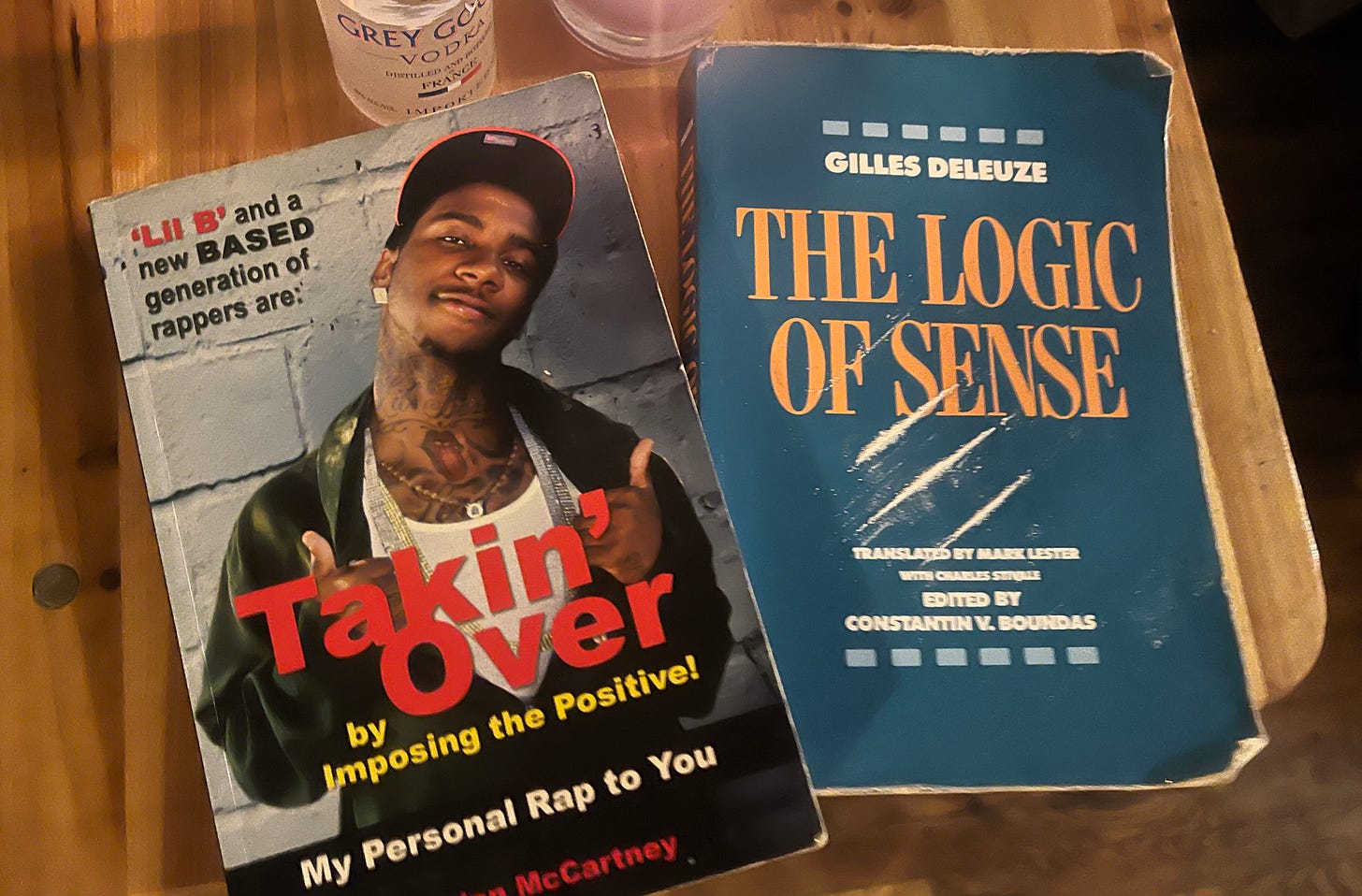


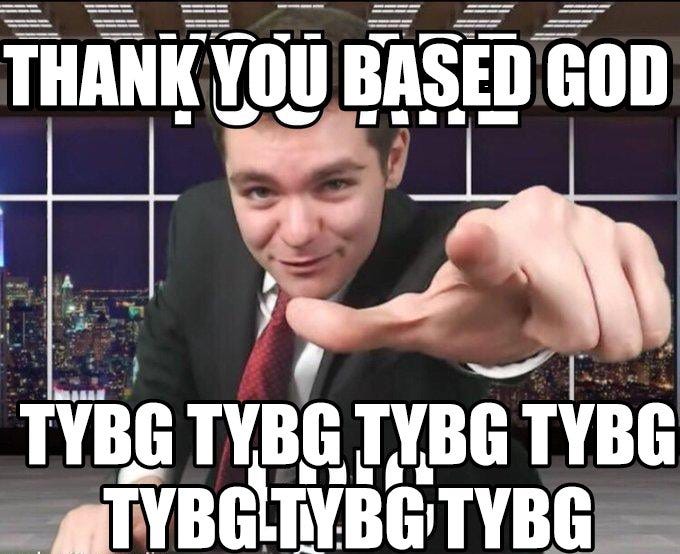
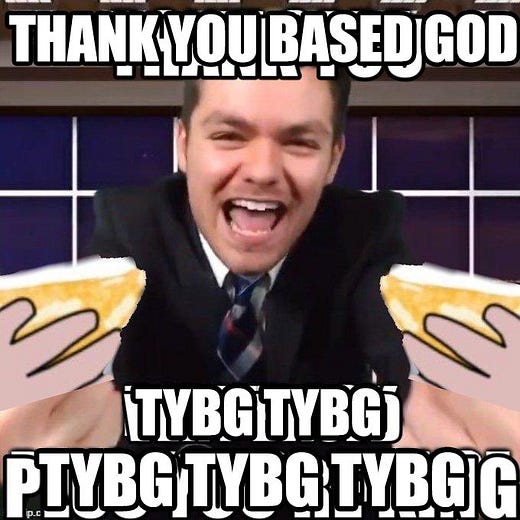
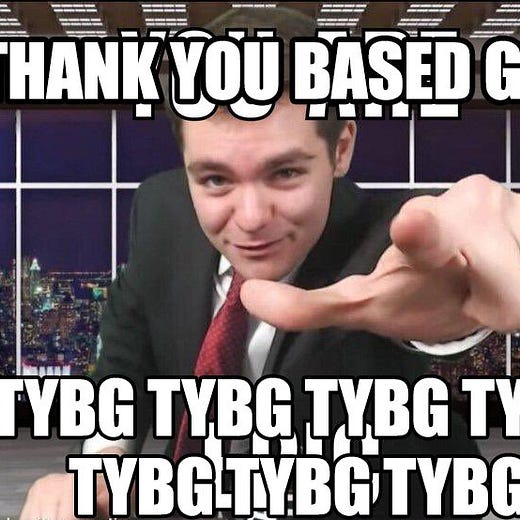
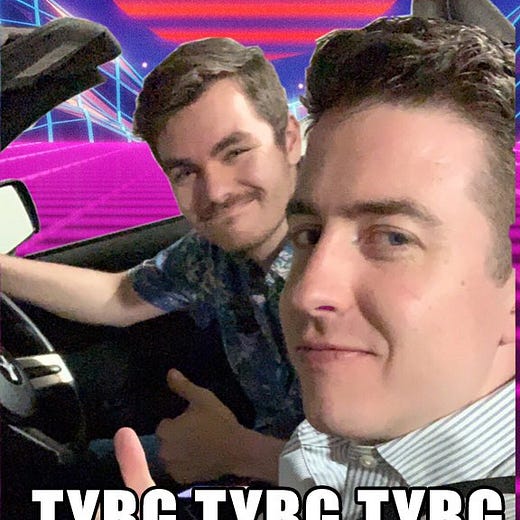
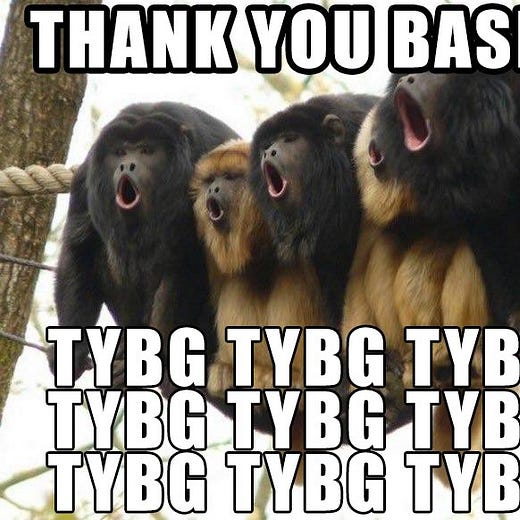

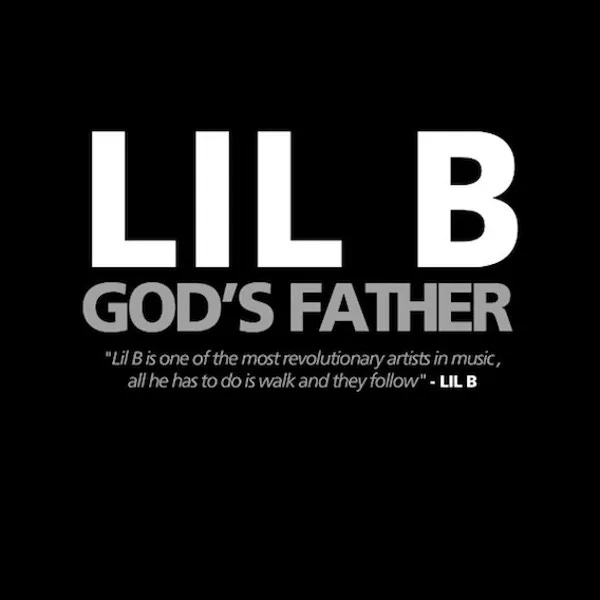
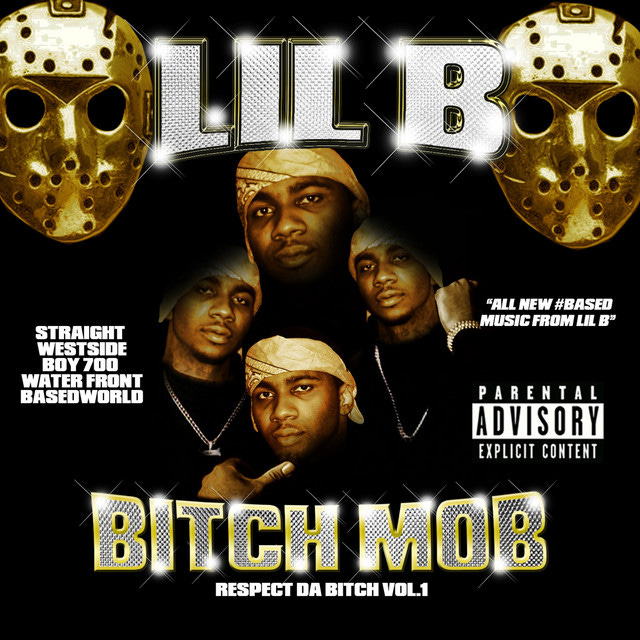

Yes, but transsexuality is not affirmed by capitalism. Except in the sense if you want a surgery you can buy it. But that's the same with a transracial surgery.
I'm assuming you refer more to the apparent /leftist/ contradiction between transracial scorn and transsexual affirmation? I think that's just a socio-political bug in the thought.
Anyway, I enjoy Lil B's unfettered exploration of things. Thanks for the overview.
TYBG